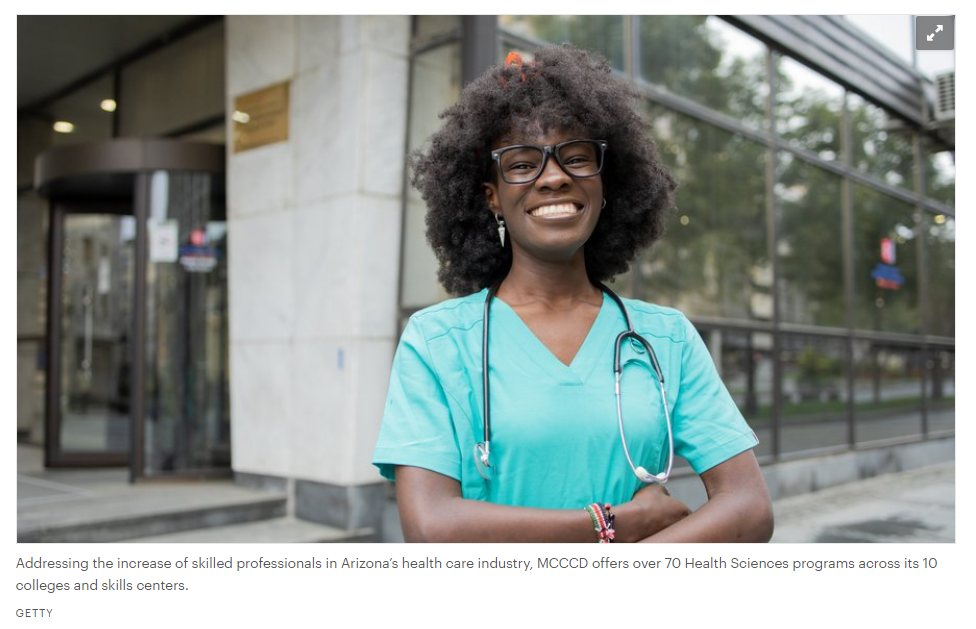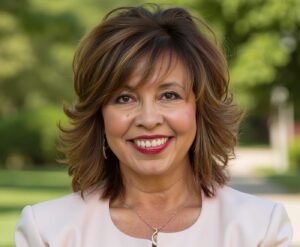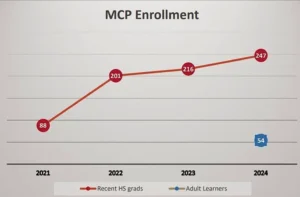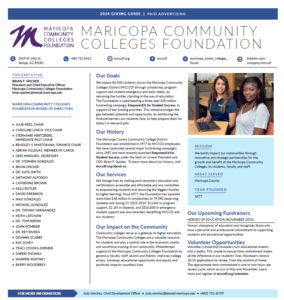By Maricopa Community Colleges
Greater Phoenix’s health care landscape is quickly transforming, with new hospitals and medical facilities opening. Despite the rapid growth in the bioscience and health care sectors, the state faces a shortage of health care professionals including primary care physicians, pharmacists, licensed practical nurses (LPNs) and registered nurses, to meet the growing demand.
Arizona is among the top five states with the most drastic health care staffing shortfalls, with the need for specialized nurses projected to increase by 23% by 2025. The scarcity of professionals isn’t limited to our state; it’s a national issue stemming from factors that include an aging workforce nearing retirement, rising health care needs among older populations, a shortage of qualified educators and burnout from the pandemic.
As one of the largest integrated health care education systems, the Maricopa County Community College District (MCCCD) serves as a vital link between education and careers. Addressing the increase of skilled professionals in Arizona’s health care industry, MCCCD offers over 70 Health Sciences programs across its 10 colleges and skills centers. These programs include sought-after bachelor’s degree programs in Nuclear Medicine Technology and Computed Tomography and Registered Nurse to Bachelor of Science in Nursing.
“We’ve seen firsthand how the health care industry is still reeling from the impact of the global pandemic. From long wait times to get an appointment to a decreasing number of primary care physicians, the challenges are evident,” said Rochelle Rivas, MCCCD district director of healthcare education. “Maricopa Community Colleges is committed to helping Arizona solve this workforce issue because Arizonans deserve access to the highest quality medical care. Our programs are tailored to industry needs and provide students with the skills and knowledge needed to excel in their profession.”
Furthermore, Arizona’s demand for LPNs is projected to increase by 25% between 2022 and 2030. To address this labor market gap, MCCCD and the Maricopa Community Colleges Foundation (MCCF) received a three-year $2.25 million grant from the Virginia G. Piper Charitable Trust to expand the number of students served in the Central, East and West Valley. Funding will not only expand program offerings at GateWay Community College (GWCC), Glendale Community College (GCC) and Mesa Community College (MCC), but also provide a pathway to increased wages and career potential through a forthcoming Fast Track Practical Nursing Program. The innovative effort aims to enroll approximately 768 students by 2026, creating equitable opportunities for students to enter the field. Since receiving the grant in 2023, MCCF has awarded $49,500 to 64 GWCC students. MCC welcomes its first cohort of LPN students this fall, and GCC will launch its program in spring 2025.
“Our more than 20-year partnership with the Virginia G. Piper Charitable Trust represents the best of what we can do together as a community,” said Brian Spicker, president and CEO, MCCF. “Their long-term support of programs across our district, including the Student Emergency Fund as well as the Achieving a College Education (ACE) program, has helped thousands of students meet their educational dreams — many of whom are first-generation, underrepresented and low-income. The trust’s $2.25 million in support of the LPN expansion extends the reach of the program by helping to address the continual nursing shortage. We have enhanced the reach of their support by working closely with other community partners, and I’m thrilled to share that an additional $750,000 has been raised, bringing the total of the LPN expansion to $3 million, thanks to the generosity of the Cowley and Burton Family Foundations and the Ben and Catherine Ivy Foundation.”
In alignment with the state’s growth in the health care sector, Maricopa Community Colleges has been instrumental in producing a highly skilled workforce. Over 2,500 students graduate each year with a Health Science certificate or degree, with 80% of graduates finding employment within the industry. The success of MCCCD’s Health Sciences programs is evident in the employment rates, which are as high as 90% to 100%. For instance, diagnostic medical sonography and ophthalmic assistants boast a 100% employment rate, while histology has an employment rate of 96%. The electroneurodiagnostic and polysomnographic technology programs have produced graduates who are employed throughout Greater Phoenix, accounting for at least 50% of the labor force in these industries.
Arizona requires more health care professionals to continue delivering essential medical care to its residents. Learn more about how MCCCD is transforming health care careers at maricopa.edu/industry.
The Maricopa County Community College District includes 10 individually accredited colleges — Chandler-Gilbert, Estrella Mountain, GateWay, Glendale, Mesa, Paradise Valley, Phoenix, Rio Salado, Scottsdale and South Mountain — and the Maricopa Corporate College, serving approximately 140,000 students with bachelor’s degrees, two-year degrees, certificates and university transfer programs.
Maricopa Community Colleges Foundation, with its donors and partners, supports the Maricopa County Community College District, its students, faculty and staff, through scholarships, programs, equipment, and financial and human capital. Visit mcccdf.org to learn more.





